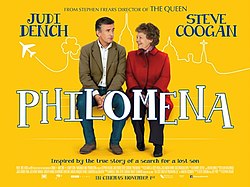
Last night Anne and I watched the film Philomena. If you don't know it, here is a brief description. The film tells the story of a lady trying to find her son who was taken from her for adoption in a Catholic home over 45 years earlier. I won't spoil the story if you haven't seen it, but the culprit in the story is undoubtedly the nuns, and the hero, at least in my mind, is Philomena herself, a woman of extraordinary grace.
What does this have to do with theology? Everything.
The film showed Philomena as a young girl having a fling with a young man, ending up pregnant and dumped at the convent by her family, where she was forgotten about. She had her baby - in incredible pain - and spent four years slaving in the laundry. Somewhere in that time, her child was adopted. Well, he was actually sold to an American couple, but 'adoption' is a nicer word. In the grounds of the convent was a cemetery. The graves here included some of the young girls who died in childbirth, as well as some of the babies.
Why did they have to work so hard and long in the laundry? Why was their pain in childbirth seen by one of the nuns as a good thing? Penance. Because the nuns were working with a theology of penance where you had to earn your forgiveness, the hard work and punishment was seen as something they deserved.
And here the question of penance it seems cannot be answered. How much is enough? How many sheets do you need to wash? How much pain do you need to survive in childbirth? How long do you need to suffer the loss of your son? How much or how long is enough to set me free? And the answer seems to be "Never." You can never do enough to earn your forgiveness.
This is evident near the end of the film when Philomena and the journalist she is working with meet an old nun who was there when Philomena's son was taken, and is still there. Everything that is wrong with a theology of penance is personified in this woman. Because she had kept her chastity and endured her 'mortification of the flesh' she seemed to think that she could keep people apart - the children looking for their natural parents, and those parents looking for their children. She believed that their suffering was required because of their actions. (The fact that the teenage girls had not taken a vow of chastity didn't seem to come into it.)
Compare this with a theology of grace. A theology that recognises the folly of penance and earning forgiveness and instead sets you free. Not free to sin, but free to live; and free to forgive.
This is what I find as I read the pages of the Bible, in both the Old and New Testaments. A message of grace and forgiveness; a message of hope; and a message of life. This is a message from God that says "While you can't, I can. While you won't, I will. I will set you free. I will forgive you. I will make you new." And once I've experienced that, how can I possibly demand that others work for their forgiveness?
So, what theology is guiding your life? A theology of penance where you have to work for forgiveness, knowing that you will never be able to do enough to be forgiven, or a theology of grace, knowing that it is all done. And it is done in Jesus.
I'll take Jesus.
No comments:
Post a Comment